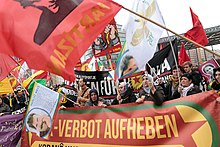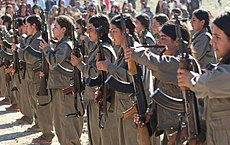Kurdistan Workers' Party
Although the PKK initially sought an independent Kurdish state, in the 1990s its official platform changed to seeking autonomy and increased political and cultural rights for Kurds within Turkey.[43] The PKK was formed as part of a growing discontent over the suppression of Turkey's Kurds, in an effort to establish linguistic, cultural, and political rights for the Kurdish minority.[55][56][57][58][59] As a result of the military coup of 1971, many militants of the revolutionary left were deprived of a public appearance, movements like the People's Liberation Army of Turkey (THKO) or the Communist Party of Turkey/Marxist–Leninist (TKP-ML) were cracked down upon and forbidden.[44] Following several years of preparation, the Kurdistan Workers Party was established during a foundation congress on 26 and 27 November 1978 in the rural village of Fîs, Lice, Diyarbakır.[citation needed] The organization has adapted the new democratic confederalist views of its arrested leader, which aim to replace the United Nations, capitalism and nation state with the democratic confederalism which is described as a system of popularly elected administrative councils, allowing local communities to exercise autonomous control over their assets while linking to other communities via a network of confederal councils.[89] Even though the PKK has several prominent representatives in various countries such as Iraq, Iran, Syria, Russia, and Europe,[90] Abdullah Öcalan stayed the unchallenged leader of the organization.The PKK had also completely moved to Qandil Mountains from Beqaa Valley, under intensive pressure, after Syria expelled Öcalan and shut down all camps established in the region.[107] The other permanent camps, in the Qandil Mountains of Iraq, have more developed infrastructure—including a field hospital, electricity generators and a large proportion of the PKK's lethal and non-lethal supplies.[113][110] In sequence HEP/DEP/HADEP/DEHAP/DTP and the BDP, which later changed its name to Democratic Regions Party (DBP) on 11 July 2014,[114] as well as the HDP and then DEM have been criticized of sympathizing with the PKK, since they have refused to brand it as a terrorist group.[124] Former police special forces member Ayhan Çarkın said that the state, using the clandestine Ergenekon network, colluded with militant groups such as the PKK, Dev-Sol and Turkish Hezbollah, with the goal of profiting from the war.[130] The possession of Devran, a book authored by the political prisoner Selahattin Demirtaş, was viewed as an evidence for a membership in a terrorist organization in 2019 because according to the prosecution it described events involving the PKK.In Germany several Kurdish entities such as the Association of Students from Kurdistan (YXK),[138] the Mesopotamia publishing house or the Mir Multimedia music label were deemed to be close to the PKK.[140] The Kurdish satellite channel Roj TV was also accused of being a branch of the PKK by Interior Minister Wolfgang Schäuble and had to end its activities in Germany in 2008.[145] The PKK has faced condemnation by some countries and human rights organizations for the killing of teachers and civil servants,[52][146] using suicide bombers,[147][148] and recruiting child soldiers.Aliza Marcus stated that some of those Kurdish smugglers who were involved in the drug trade, either because they truly believed in the PKK—or because they thought it a good business practice (avoid conflicts)—frequently donated money to the PKK rebels.According to Turkey, those countries the PKK previously or currently received support from include: Greece,[170][171] Cyprus,[172] Iran,[173] Iraq,[174] Russia,[175] Syria,[173] Finland,[176] Sweden[176] and the United States.The vast majority of PKK's actions have taken place mainly in Turkey against the Turkish military, although it has on occasions co-operated with other Kurdish nationalist paramilitary groups in neighboring states, such as Iraq and Iran.[247] From the mid-1990s, the organization began to lose the upper hand in its operations as a consequence of a change of tactics by Turkey and Syria's steady abandonment of support for the group.[250] In March 1993 Öcalan, in presence of PUK leader Jalal Talabani declared a unilateral ceasefire for a month in order to facilitate peace negotiations with Turkey.To this event, the Kurdish politicians Jamal Talabani, Ahmet Türk from the People's Labor Party (HEP) and also Kemal Burkay also attended and declared their support for the ceasefire.[255][256][257][258][excessive citations] In the late 1980s and early 1990s, in an effort to win increased support from the Kurdish peasantry, the PKK altered its leftist secular ideology to better accommodate and accept Islamic beliefs.[263][264][265] The leader of the organization, Abdullah Öcalan, was captured, prosecuted and sentenced to death, but this was later commuted to life imprisonment as part of the government's seeking European Union membership.[276][277][278] As a result of increasing Kurdish population and activism, the Turkish parliament began a controlled process of dismantling some anti-Kurdish legislation, using the term "normalization" or "rapprochement", depending on the sides of the issue.The stated purpose of the organizational change was to leave behind nationalistic and state-building goals, in favor of creating a political structure to work within the existing nation-states."[297] The prospect of armed Kurdish forces in northern Iraq threatens to increase tensions between the region and Baghdad who are already at odds over certain oil producing territory.[301] As part of the civil war, many PKK fighters laid down arms in Turkey and moved to Syria, facilitating the creation of a progressive Kurdish government in Rojava.[302] Iraqi Kurdistan President Masoud Barzani backed the initiative saying, alongside Erdogan: "This is a historic visit for me ... We all know it would have been impossible to speak here 15 or 20 years ago.[307] In September 2014, during the Siege of Kobanî, some PKK fighters engaged with Islamic State forces in Syria who were attacking Kurdish city Kobane, which resulted in conflicts with Turks on the border and an end to a cease-fire that had been in place over a year.[309] A number of Turkish Kurds rallied in large-scale street protests, demanding that the government in Ankara take more forceful action to combat IS and to enable Kurdish militants already engaged against IS to more freely move and resupply.[323] In October 2024, the PKK claimed responsibility[324] for a deadly attack on Turkish Aerospace Industries (TUSAŞ) headquarters, resulting in 5 deaths, including four civilians, and 22 injuries.










KurdishAbdullah ÖcalanMurat KarayılanCemîl BayikDuran KalkanBesê HozatSozdar AvestaBahoz ErdalMustafa KarasuPeople's Defence ForcesFree Women's UnitsCivil Defense UnitsKurdistan Communities UnionPeoples' United Revolutionary MovementQandil MountainsIdeologyKurdish nationalismDemocratic confederalismLibertarian socialismProgressivismAnti-capitalismCommunalismJineologyMarxism–LeninismPolitical positionLeft-wingTİKKOIslamic StateTurkeyEuropean UnionKurdish HezbollahKurdistan Workers' Party insurgencyIsrael–PKK conflict1982 Lebanon WarKurdistan Region–PKK conflictIraqi Kurdish Civil WarSyrian Civil War2017 Iraqi–Kurdish conflictKurdish Hezbollah insurgencyDesignated as a terrorist groupUnited StatesCanadaAustraliaUnited KingdomNew ZealandmilitantguerrillamovementKurdistansoutheastern Turkeynorthern IraqZiyaret, LiceKurdish–Turkish conflict2013–2015autonomypolitical and cultural rights for Kurdsdesignated as a terrorist organizationCourt of Justice of the European Unionrevolutionary socialismmilitary coup of 1980denied the existence of Kurds15 August 1984captured and imprisonedIranianSyrian Kurdistanceasefirepeace processterror tacticscivilianschild soldiersthousands of Kurdish villagescoup of 1971People's Liberation Army of TurkeyCommunist Party of Turkey/Marxist–LeninistAnkaraTurkish KurdistancolonizationKurdish cultureKurdish languagefolkloreTurkish peopleKurds in TurkeyMazlûm DoganJustice PartyOcalanDev-Gençworldwide communist revolutionRecep Tayyip Erdoğandemocratic confederalistUnited Nationscapitalismnation stateBijî Serok ApoFriday prayersMuhammadZoroastrianismnom de guerreFehman HuseyinSyrian Kurdpopular frontumbrella organizationpeasantrycapture of Abdullah ÖcalanFranceGermanyNetherlandsPeople's Defense ForcesYJA-STARCivil Protections UnitsPatriotic Revolutionary Youth MovementYPS-JinBeqaa ValleyMahsum Korkmaz AcademyDamascusKurdish Civil WarGulf WarOperation Provide ComfortPeoples' Democratic Party (HDP)2015 Turkish general electiondemonstrationsKurdish Political Movement in TurkeyGrand National Assembly of TurkeyDemocratic Regions PartyDTP was initiated a closure caseconstitutional courtHDP was also initiated a closure case